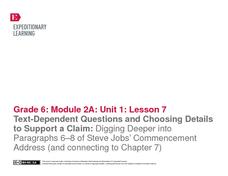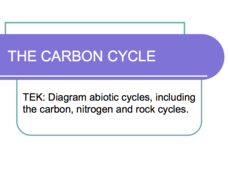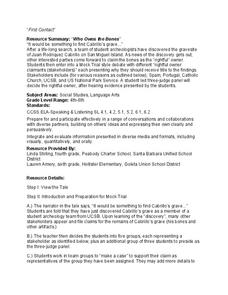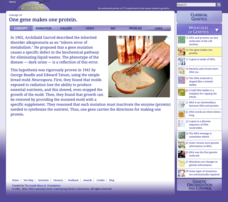Khan Academy
Challenge: Constellation Maker
Populate your own universe with constellations and stars. Modify the existing JavaScript code to use the push method of arrays, and mouseX and mouseY to draw a star based on the click and position of the mouse.
University of Nottingham
The Periodic Table of Videos
Use QR code readers to turn the periodic table into a YouTube channel for learning. Scan an element and then watch a short video from the University of Nottingham examining the properties of the element, where it be found in nature, and...
What So Proudly We Hail
Life, Liberty, and the Pursuit of Happiness: A Lesson on the Declaration of Independence
What does it mean to say that a right is unalienable? How did the founding fathers convey this revolutionary concept in the Declaration of Independence? Engage in a close reading and analysis of the Declaration of Independence, and...
We are Teachers
Paul Reimer Quote
What do you tell your learners when they ask why they need to learn math? Use a poster with a quote by Fresno Pacific University instructor Paul Reimer that explains why we use mathematics, and how it helps us understands the events in...
EngageNY
Text-Dependent Questions Text-Dependent Questions and Making a Claim: Digging Deeper into Paragraphs 12–14 of Steve Jobs’ Commencement Address (and connecting to Chapter 9)
Readers draw connections between Bud, Not Buddy and Steve Jobs' 2005 Stanford University commencement address and cite evidence from the two texts to support their analysis.
EngageNY
Text-Dependent Questions and Making a Claim: Digging Deeper into Paragraphs 20–23 of Steve Jobs’ Commencement Address (and connecting to Chapter 11)
In preparation for the unit exam, groups employ the strategies they have been practicing to formulate an interpretative claim about the connections between Christopher Paul Curtis's " Bud, Not Buddy, and Steve Jobs' 2005 Stanford...
EngageNY
Getting the Gist and Determining Word Meaning: Paragraphs 20–23 of Steve Jobs’ Commencement Address (and connecting to Chapter 10)
Groups create a list of the character traits of Steve Jobs and Buddy, the main character of Christopher Paul Curtis' Bud, Not Buddy, and share and select evidence from Jobs' 2005 Stanford University Commencement Address to support their...
EngageNY
Text-Dependent Questions and Choosing Details to Support a Claim: Digging Deeper into Paragraphs 6–8 of Steve Jobs’ Commencement Address (and connecting to Chapter 7)
Readers learn how to choose specific details drawn from a primary source (Steve Jobs' 2005 Stanford University commencement address) to support an analysis of informative text.
Illustrative Mathematics
Solar Eclipse
Learners take on the role of astronomers, calculating conditions necessary for a total solar eclipse. Concepts of similar triangles and properties of circles come together as pupils create ratios and use real measurements in determining...
Maryland Department of Education
The Concept of Diversity in World Literature Lesson 4: Proverbs
"Eneke the bird says since men have learnt to shoot without missing, he has learnt to fly without perching." As part of their study of Things Fall Apart, class members read Paul Hernadi and Francis Steen's essay, "The Tropical Landscapes...
media.yurisnight.net
Science Lesson Plan: Our Solar System: I Wonder?
Ever wonder why Pluto isn't considered a planet? Or how large the Earth is compared to the other inner planets? Explore the universe with a series of projects that simulate different aspects of our solar system. The activities require...
Virginia Department of Education
Solar System Model
How many planets can you name? Did you get all 13 in our solar system, including the dwarf planets, or were you surprised when you read there are 13 planets? The instructional activity helps scholars understand the scale of the universe...
Macmillan Education
Social Skills
Every culture has a set of social skills one must learn to establish and maintain relationships. Some of these skills are particular to a culture and some are universal. Class members practice using appropriate language, polite manners,...
Wylie Independent School District
The Carbon Cycle
Carbon is the fourth most abundant element in the universe (in terms of mass), behind hydrogen, helium, and oxygen. Scholars learn about the carbon cycle, from ways carbon is removed from the atmosphere to how it is added in an 18-slide...
PHET
Generator
Michael Faraday was self-educated, earned an honorary doctorate from the University of Oxford, invented the first Bunsen burner, discovered the laws of electrolysis, and proved that a changing magnetic field produces a current. In this...
National Constitution Center
Town Hall Wall: College Exam
The college that directly affects young citizens' lives is not the university they're applying to. Learn about the Electoral College in a town hall activity in which class members debate the merits of the current system versus electing a...
McGraw Hill
Neutron Stars Interactive
The universe is full of sources of energy. Explore the energy of pulsars with your classes through a simulation. An interactive lesson allows learners to manipulate the angle of rotation of both the earth and the pulsars. A real-time...
Bowels Physics
Methods of Motion
How could you earn a $6,000,000 speeding ticket? This presentation uses an analogy that relates speed in the universe to the cost of a speeding ticket. Scholars ultimately understand that motion is relative. Also covered is the concept...
Channel Islands Film
Who Owns the Bones
A study of the history of the Channel Islands, located off the coast of southern California, continues as class members conduct a mock trial to determine which group of stakeholders should have the right to claim the remains of Juan...
EngageNY
Grade 9 ELA Module 4, Unit 1, Lesson 2
The second instructional activity in a unit about how writers develop their central ideas and use evidence to support their arguments focuses on the role that scholars at Jundi Shapur, "The World's First True University," played in the...
Physics Classroom
Using Graphs
Many university professors complain incoming scholars struggle with interpreting graphs. A skill builder offers three different types of exercises including calculating slope, interpreting graphs, and extrapolating outside the plotted...
Equality and Human Rights Commission
Taking Action
The Universal Declaration of Human Rights passed in 1948 when the majority of members of the United Nations voted in favor of the resolution. Scholars use their knowledge of human rights to determine ways they personally can help promote...
Orlando Shakes
The Best of Enemies
History comes to life with the play The Best of Enemie. Scholars learn literary elements as well explore racial issues in American history. The play is based on a true story and addresses the universal truth that people are capable of...
Cold Spring Harbor Laboratory
One Gene Makes One Protein
Very few universities still offer a master's degree in the ecology of grasses, but that was the degree that led George Wells Beadle to an interest in genetics and later a Nobel Prize. Scholars learn about the discoveries of Dr. Beadle...

























